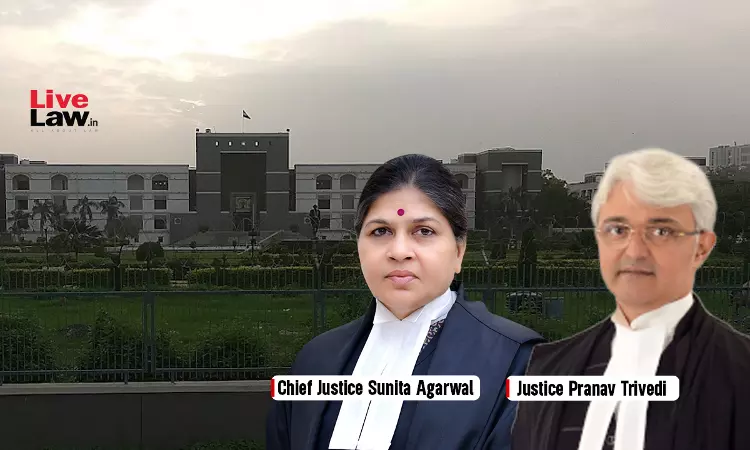- Home
- /
- High Courts
- /
- Gujarat High Court
- /
- Gujarat High Court Upholds 2023...
Gujarat High Court Upholds 2023 Amendment Empowering Executive Magistrate To Inquire Into Delay In Registration Of Births & Deaths
Lovina B Thakkar
14 May 2025 2:00 PM IST
The Gujarat High Court has upheld the validity of a 2023 amendment to Section 13 of Registration of Births and Death Act that transferred the authority to inquire into the delayed registration of birth and deaths beyond a year from Judicial Magistrate to Executive Magistrate or District Magistrate(DM).The court was hearing a plea challenging the amendment to Section 13 on the ground that it...
The Gujarat High Court has upheld the validity of a 2023 amendment to Section 13 of Registration of Births and Death Act that transferred the authority to inquire into the delayed registration of birth and deaths beyond a year from Judicial Magistrate to Executive Magistrate or District Magistrate(DM).
The court was hearing a plea challenging the amendment to Section 13 on the ground that it is against Section 3(2)(a) BNSS wherein any inquiry regarding evaluation of evidence is to be adjudicated by Judicial Magistrate and the Executive Magistrate under Section 3(2)(b) BNSS can only conduct an administrative/executive inquiry.
The amended Section 13(3) states that any birth or death of which delayed information is given to the Registrar after one year of its occurrence, shall be registered only on an order made by a "District Magistrate or Sub-Divisional Magistrate or by an Executive Magistrate authorised by the District Magistrate", having jurisdiction over the area where the birth or death has taken place, after verifying the correctness of the birth or death and on payment of such fee as may be prescribed. Prior to the amendment only a judicial magistrate first class or presidency magistrate could grant such a registration after verifying the correctness of the information.
A division bench of Chief Justice Sunita Agarwal and Justice Pranav Trivedi in its order:
“Having carefully gone through the provisions of Sections 3 and 4 of the BNSS, 2023, we are of the opinion that the provisions of sub-section(2)(a) of Section 3 cannot be pressed into service so as to assail the validity of the amendment to Section 13(3) of the Registration of Birth and Deaths (Amendment) Act, 2023, whereby the Executive Magistrate appointed under sub-section(1) of Section 20 of the Criminal Procedure Code, 1973 (Section 14(1) of BNSS '2023) has been authorised to make an inquiry into the matter of registration of birth or death on a delayed information beyond the period of one year of its occurrence. The wisdom of the Legislature to confer powers of inquiry upon the Executive Magistrate cannot be questioned by us on the above submission. No other arguments have been pressed”.
"The challenge to the validity of the amended Section 13(3) of Registration of Birth and Deaths (Amendment Act) 2023, is therefore, turned down," the court added.
The petition was filed challenging the validity of the amendment to Section 13 (procedure to register births and deaths that were not reported within the prescribed time period) of the Registration of Birth and Deaths (Amendment Act) 2023 that transferred the power to inquire into the delay of one year in registration of birth and death to the Executive Magistrate/District Magistrate appointed under Section 20(1) of the CrPC which is Section 14 BNSS.
Senior Counsel Shalin Mehta appearing for the petitioner argued that earlier as per Section 13(3), only Judicial Magistrate First Class or Presidency Magistrate were empowered to make an inquiry into the non-registration of birth and death of a person within one year.
He contended that transferring the power for conducting such an inquiry from Judicial Magistrate to Executive Magistrate is contrary to Section 3(2)(a) BNSS. He further argued that under Section 3(2)(a) BNSS, any inquiry regarding evaluation of evidence is to be adjudicated by Judicial Magistrate, while, Executive Magistrate is confined to the power under Section 3(2)(b) regarding the administrative or executive inquiry.
The Court after noting the submissions and provisions observed, “Having carefully gone through the same, we find that subsection 2(a) of Section 3 of BNSS '2023, speaks of such inquiry by a magistrate under any law, other than Sanhita where the powers exercised by him relate to the functions which exposes any person to any punishment or penalty or detention in custody pending investigation, inquiry or trial or would have the effect of sending him for trial before any Court, subject to the provisions of the BNSS, 2023 (Sanhita).”
The Court further noted that Section 4 of the BNSS states all offences under BNSS must be “investigated, inquired into, tried and handled” as per the provisions and Section 4(2) clarifies the offences under any other law to follow the same procedures of BNSS unless there is another law in force that deals with it.
The court thus dismissed the petition.
Case Title: Minaxi Chandulal Shah & Ors. vs Union of India
Case Number: SCA No. 3502 of 2025
Click Here To Read/Download Order
Citation: 2025 LiveLaw (Guj) 76



